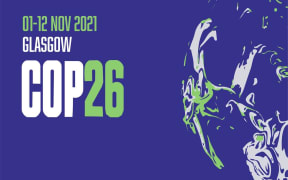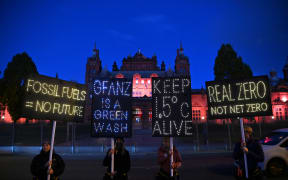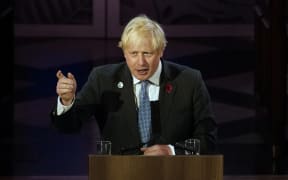Iwi representatives of the New Zealand delegation at COP26 say the Treaty of Waitangi can set a precedent for global indigenous rights.

The COP26 gathering has heard multiple calls to empower indigenous initiatives to save the planet. Photo: AFP
Alison Anitawaru Cole, of South Taranaki Ngāruahine, Ngāti Ruanui, and Taranaki Whānui drafted a briefing note for the climate meeting that explains how Te Tiriti o Waitangi and the Waitangi Tribunal is a system that directly gives finance to indigenous communities to exercise kaitiakitanga.
This is an example of what Cole believes should be included in the legal text that comes out of COP26.
"I say as a Māori person I know there are challenges and critiques over the Waitangi Tribunal, but in terms of what we can constructively bring to the conversation is an example of using the law as a mechanism and a means to channel financial support directly to indigenous communities for them to receive the money without state intervention.
"Indigenous folks are protecting over 80 percent of global diversity of species in flora and fauna. So if we are looking at advancing climate objectives we need to be bringing as much as we can to empower the indigenous co-designed leadership and going beyond the notion of participation into the idea of actual management of the climate legal regime.
Cole is an indigenous law, human rights and environment consultant.
Cole said there needs to be extra specification of an indigenous rights-based approach within the legal text, if we are talking about setting up a carbon market like the emissions trading scheme but on a global scale what does that really mean.
"If we are setting up a carbon credit system and looking at spaces where you can effectively draw down emissions from the atmosphere and generally that's going to be forests around the world and most are sacred and heritage forests that are being protected by indigenous guardians.
"We have got to have that indigenous representation, participation, and fully informed prior consent right at the heart of any type of carbon market that comes out of COP26."
Cole says they have been collaborating with other indigenous groups from around the world.
"Everyone brings something unique to the table."
Cole says she is pleasantly surprised with some of the initial legal texts that have come through so far.
"There is an inclusion of a rights based approach and indigenous peoples rights but the trust is low. How long has this taken? Twenty-to-30 years?
"We have seen throughout dialogues and negotiations that indigenous folks are standing up and saying this is great but we know from the past that these could be words in the wind."
Cole says she has been using some creative ways to engage with leaders.
She brought copies of the climate report by Ngā Pae o te Maramatanga and the Climate Justice Taranaki reports to shows New Zealand's experience and the indigenous impacts on climate change
"I was able to hand deliver Nga Pae o Maramatanga to the president of COP26, I chased after him as he was leaving one of our indigenous caucus meetings to give it to him."
Cole has been working with Climate Justice Taranaki looking at community-based responses and proposals to climate resilience.
"It's an opportunity to put Māori research directly into the hands of negotiators from around the world."
Cole says the negotiations is so separated from the on-ground realities of climate change.
"I think back to Ōhawe and I translate and transpose everything happening into my local context and I'm constantly messaging and connecting with my cousins.
"Its colonialism and the patriarchy written in capital letters. The whole translation is put on my shoulders. Where is meeting us half way.
"We are not seeing a kind of cultural meeting point there is lots of innovation within the climate law space.
Successes of the Waitangi Tribunal process in Aotearoa:
-
As of October 2020, 90 settlements had been passed into law, with a total value of NZ$2.72 billion.
- Some claims are settled through direct negotiations with the Government, such as Waikato-Tainui's settlement worth NZ$170 million in 1995.
- Some agreements include a 'relativity clause', causing additional payments to be made when the total value of settlements pass a certain threshold. This was triggered in 2017, giving Waikato-Tainui an additional NZ$190 million and Ngāi Tahu NZ$180 million (both more than their original settlements).
- The direct transfer of cash and assets enables Indigenous communities to invest in their own community-based solutions. Waikato-Tainui and Ngāi Tahu reinvested their settlements into successful business ventures each worth over NZ$1 billion.
- Settlements commonly involve co-governance of natural resources in arrangements that respect tikanga Māori, or Māori practices, such as kaitiakitanga, or stewardship.
- As part of settlement processes, Aotearoa was the first country in the world to grant legal personality to natural features: in 2014, Te Urewera attained legal personality, allowing Ngāi Tūhoe to promote the interests of their people and their rohe (traditional lands) in a ground-breaking way. Legal personality has since been granted to Whanganui Awa, the Whanganui River.





